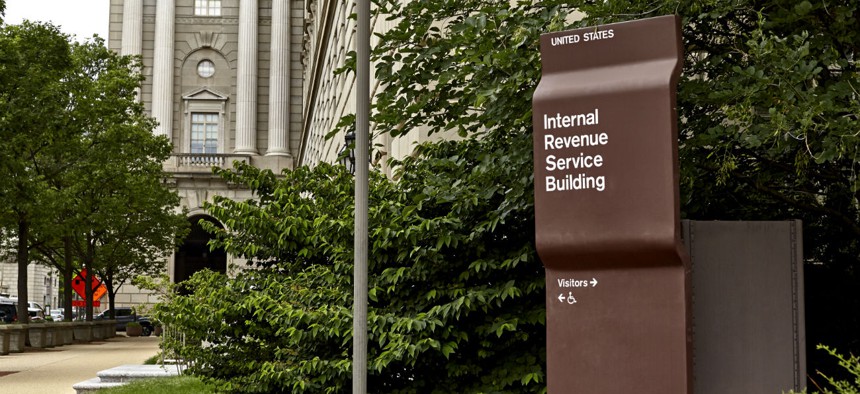
By Pamela Au / Shutterstock.com
Shutdown’s Damage to IRS Morale and Customer Service Will Linger, Study Finds
The appropriations lapse occurred during filing season, the agency’s busiest time of year, and will affect next year’s filing season as well.
The Internal Revenue Service’s customer service and staff morale were significantly damaged by the recent government shutdown that occurred during the agency’s busiest season, and are still recovering, according to a report.
The Partnership for Public Service issued a report on Sept. 20 that highlighted some of the workforce and operational issues the agency faced during the Dec 22, 2018, to Jan. 25, 2019, shutdown that resulted from a border wall funding fight and occurred during the first filling season under the Trump administration's tax reform law.
“For one of the busiest times of the year for the IRS, we had the lowest amount of service on the phones that I’ve seen in my whole career,” said Nina Olson, former head of the Taxpayer Advocate Service, an independent organization within the IRS that helps people resolve tax problems.
Initially, about 10,000 (12.5%) of the 80,000 IRS employees were permitted to work. Over the course of the 35-day shutdown, more were brought back, but they had limited functions. Only a few days before the shutdown ended could employees answer phones, issue refunds and enter into installment agreements. The Taxpayer Advocate Service could not “advocate on behalf of taxpayers who were experiencing significant hardships,” had less than 100 of its 1,700 employees working and canceled over 16,000 assistance appointments nationwide, according to the report.
“Our job is to help taxpayers,” said Diane Himelstieb, local taxpayer advocate in St. Petersburg, Florida, who was the only one in her office authorized to work. “To read about their problems without being able to do anything to help them was absolutely heartbreaking.”
Olson said there was a five-week delay in the hiring and training of customer service employees, which left the IRS more than 2,000 workers short of what it needed to answer taxpayers’ calls during the filing season from Jan. 28-April 15. The level of service (how the IRS measures customers’ phone experience) decreased from 78% in 2018 to 57% in 2019, as a result. This was a “trend that persisted throughout the entire tax filing season and affected millions of taxpayers,” according to the Partnership.
In addition to calls, the IRS wasn’t able to address 80,000 taxpayer responses to Earned Income Tax Credit audits, a refundable tax credit for low and moderate-income working people. “When households are audited, the IRS blocks the tax credit or refund, so a delay in processing responses to audits took money out of the pockets of low and middle-income taxpayers,” said the report.
The IRS also wasn’t able to lift liens or levies for taxpayers, so the IRS had to freeze some taxpayers’ accounts unfairly. The IRS worked to help the taxpayers who were harmed, but Olson said the larger problem was, “having to reverse what could have been avoided if there hadn’t been a shutdown.”
When IRS workers came back to work they were “dealing with the repercussions of 5 million unanswered taxpayer letters, 87,000 amended tax returns waiting for review and thousands of stalled audits.” Employee morale suffered as a result of the stress during and after the shutdown.
“The experience of the shutdown can put employee morale in dangerous territory, which continues to be a concern for IRS leadership,” said the Partnership. “The IRS Best Places to Work in the Federal Government engagement score declined in 2018, a finding based on a federal survey taken before the shutdown occurred.”
The Partnership cited a study by researchers at Weber State University that looked at a Utah community with a high concentration of IRS workers. Of the roughly 5,000 furloughed workers surveyed, more than 35% missed a rent or mortgage payment, 30% went to a food pantry, 72% experienced mental health issues, 42% wanted to make a career change and 65% were very or somewhat concerned about their finances post-shutdown.
On April 11, IRS Commissioner Chuck Rettig said the IRS had a “smooth filing season” despite the “biggest tax law change since 1986.” He praised the IRS employees for their hard work and dedication.
However, the effects of the longest-ever shutdown "on IRS employees, the agency’s operations and taxpayers were wide-ranging and did not end when Congress resumed operations,” according to the Partnership. “In March 2019, Olson told a House Ways and Means Oversight Subcommittee that it would take 12 to 18 months for the IRS to catch up from the lost work, with effects spilling into the next filing season.”







